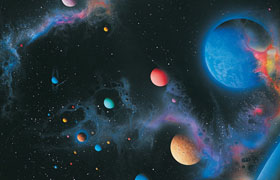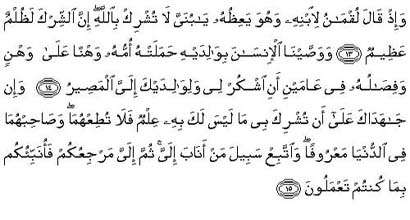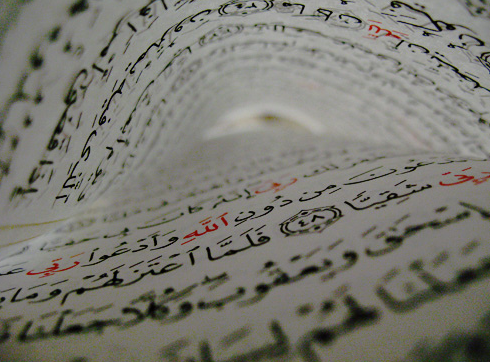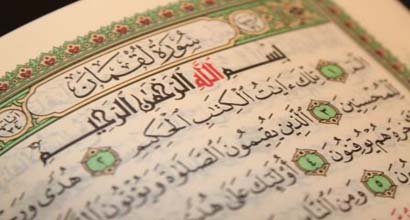Truth Seeker
-
When we believe in God, we are responding to our nature, and because it is in harmony with our nature, the existence or absence of faith must have a marked effect on a person's life.
-
To some people, religion has been a great device to control people throughout ages. They are turned off by all the cruelties and injustice that have been done in the name of religion.
-
Many atheists demand a scientific proof for the existence of God. I agree that today is the age of science and technology. Let us use scientific knowledge to kill two birds with one stone, i.e. to prove the existence of God and simultaneously prove that the Qur’an is a revelation of God.
-
The question is whether it is better to have the opportunity of enjoying an eternal life of bliss, or to miss that chance altogether by following the delusion that we can be happy without God.
-
The meticulous care and concern a wild animal like the crocodile shows its offspring is only one of the examples proving the invalidity of the evolutionist claim of the struggle for life which maintains that the strong survive while the others are defeated and disappear. The dolphin is another animal known for its self-sacrificing behavior. Dolphins raise their offspring with great care from the moment they are born. As soon as the newborn dolphin is born...
-
From the moment man opens his eyes to this world a great order surrounds him. He needs oxygen to survive; it is interesting that the atmosphere of the planet on which he lives provides more than just the adequate amount of oxygen he needs. This way, he breathes without difficulty. For the existence of life on this planet, the existence of a source of heat is essential.
The Faith
-
Some may oppose the Islamic system of government claiming that under the Islamic rules, non-Muslims’ rights will be neglected and marginalized. The clear texts and established history can refute this misconception, as many years ago non-Muslims possessed many privileges under Islamic rule. It is established Jewish history that the Jews [...]
-
If there is a decisive text (not carrying the possibility of interpretation) coming from the Qur’an or authentic Hadith, then it is established law for Muslims and no one has a right to suggest otherwise. God says: “It is not for a believer man or woman, when God and His [...]
-
Noam Chomsky Al-Ahram Weekly, November 18-24, 2004 “Since the issue of Palestinian national rights in a Palestinian state reached the agenda of diplomacy in the mid-1970s, ‘the prime obstacle to its realization’, unambiguously, has been the United States government, with the Times staking a claim to be second on the [...]
-
Muslims, contrary to other systems of law, are obligated to derive their legislations and laws from Qur’an (The word of God revealed to Muhammad) and the Sunnah (the authentic sayings and actions the Prophet). If any issue is not settled decisively in Qur’an or the Sunnah, Muslims scholars have the [...]
-
If there is a decisive text (not carrying the possibility of interpretation) coming from the Qur’an or authentic Hadith, then it is established law for Muslims and no one has a right to suggest otherwise. God says: “It is not for a believer man or woman, when God and His [...]
-
Muslims, contrary to other systems of law, are obligated to derive their legislations and laws from Qur’an (The word of God revealed to Muhammad) and the Sunnah (the authentic sayings and actions the Prophet). If any issue is not settled decisively in Qur’an or the Sunnah, Muslims scholars have the [...]
New Muslims
-
What does the word Hadith mean, and what’s the difference between Hadith and Sunnah? Where do Islam and Muslims stand from them?
-
In this video, Sheikh Usamah Adh-Dhahabi speaks about the meaning of the Sunnah and the necessity to follow the Prophet in all his actions and sayings. He also warns of the dangers in adopting religious innovations mistakenly thinking there is nothing wrong with them.
-
Linguistically, Sunnah means a way or method that can have two states, either good or bad. It is derived from the word "Sanan", which is Arabic for: a road or a path. Sunnah in this sense is mentioned in the hadith of the Messenger of Allah in which he said...
-
The authenticity of any scripture is considered from two significant aspects; the first is its authenticity with regard to its divine origin, and the other is its preservation in its original form.
-
What does the word Hadith mean, and what’s the difference between Hadith and Sunnah? Where do Islam and Muslims stand from them?
-
Dr. Abdul Hakim Quick In Dubai-Following In The Footsteps of Muhammad (peace be upon him).
Learn the Qur'an
-
What are the types of showing off? Why does Allah describe the people that you should follow as those who repent to Him?
-
Word by word Imam Suhaib explains the meaning of each verse, showing the significance behind God’s use of certain….
-
How are the gates of Paradise open to believers on the Day of Judgment and why? What about the Hellfire’s? What does this mean?
-
What are the types of showing off? Why does Allah describe the people that you should follow as those who repent to Him?
-
When and where was Surat Luqman revealed? What is meant by wisdom of prophet Luqman?
-
What are the learned lessons in Surat Luqman that reflect the eloquence of the Qur`an?
Prayer In Islam
-
The Islamic or Hijri calendar is based on a lunar month of 29 to 30 days, with the day starting at sunset. The Islamic year consists of twelve months: (1) Muharram, (2) Safar, (3) Rabi` Awwal, (4) Rabi` Thani, (5) Jumada Awwal, (6) Jumada Thani, (7) Rajab, (8) Sha`ban, (9) Ramadan, (10) Shawwal, (11) Dhul- Qi`dah, (12) Dhul- Hijjah.
-
Click here to know the accurate Prayer times for 6 Million Cities Worldwide.
-
Click here to know the accurate Prayer times for 6 Million Cities Worldwide.









![Some may oppose the Islamic system of government claiming that under the Islamic rules, non-Muslims’ rights will be neglected and marginalized. The clear texts and established history can refute this misconception, as many years ago non-Muslims possessed many privileges under Islamic rule. It is established Jewish history that the Jews [...] Some may oppose the Islamic system of government claiming that under the Islamic rules, non-Muslims’ rights will be neglected and marginalized. The clear texts and established history can refute this misconception, as many years ago non-Muslims possessed many privileges under Islamic rule. It is established Jewish history that the Jews [...]](http://www.the-faith.com/wp-content/uploads/2011/03/csc.png)
![If there is a decisive text (not carrying the possibility of interpretation) coming from the Qur’an or authentic Hadith, then it is established law for Muslims and no one has a right to suggest otherwise. God says: “It is not for a believer man or woman, when God and His [...] If there is a decisive text (not carrying the possibility of interpretation) coming from the Qur’an or authentic Hadith, then it is established law for Muslims and no one has a right to suggest otherwise. God says: “It is not for a believer man or woman, when God and His [...]](http://www.the-faith.com/wp-content/uploads/2011/03/cscssc.png)
![Noam Chomsky Al-Ahram Weekly, November 18-24, 2004 “Since the issue of Palestinian national rights in a Palestinian state reached the agenda of diplomacy in the mid-1970s, ‘the prime obstacle to its realization’, unambiguously, has been the United States government, with the Times staking a claim to be second on the [...] Noam Chomsky Al-Ahram Weekly, November 18-24, 2004 “Since the issue of Palestinian national rights in a Palestinian state reached the agenda of diplomacy in the mid-1970s, ‘the prime obstacle to its realization’, unambiguously, has been the United States government, with the Times staking a claim to be second on the [...]](http://www.the-faith.com/wp-content/uploads/2011/05/reshape.jpg)
![Muslims, contrary to other systems of law, are obligated to derive their legislations and laws from Qur’an (The word of God revealed to Muhammad) and the Sunnah (the authentic sayings and actions the Prophet). If any issue is not settled decisively in Qur’an or the Sunnah, Muslims scholars have the [...] Muslims, contrary to other systems of law, are obligated to derive their legislations and laws from Qur’an (The word of God revealed to Muhammad) and the Sunnah (the authentic sayings and actions the Prophet). If any issue is not settled decisively in Qur’an or the Sunnah, Muslims scholars have the [...]](http://www.the-faith.com/wp-content/uploads/2011/03/3443tt.png)











